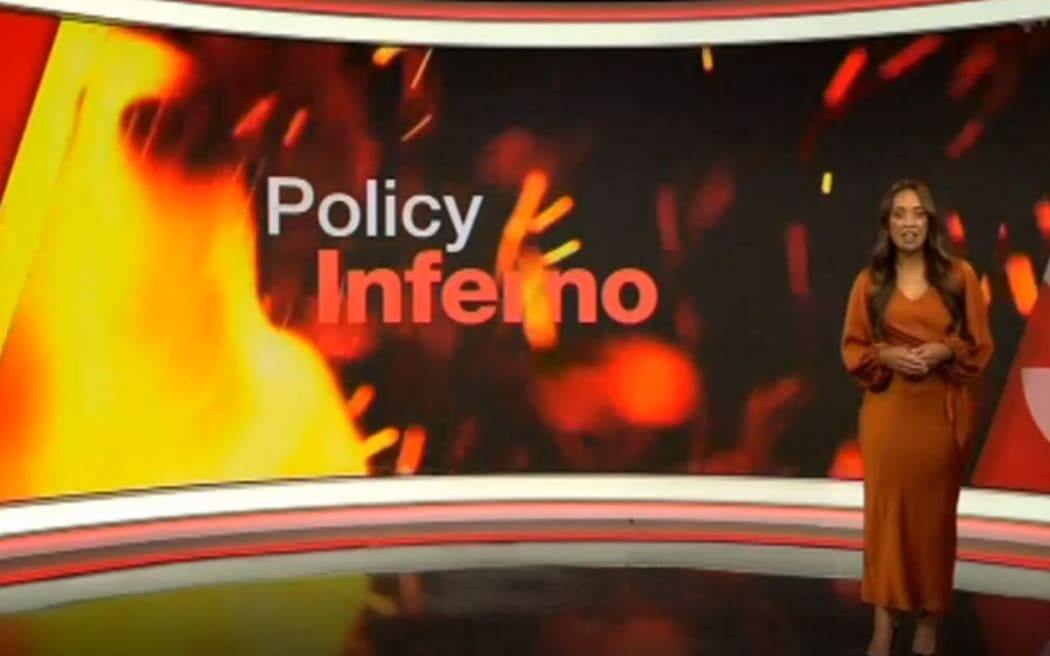
Newshub at 6 sums up the 'bonfire of the policies' announced by the PM this week. Photo: screenshot / Newshub at 6
Chris Hipkins won media plaudits for his political strategy after scrapping or deferring some of Labour's policy in his latest policy bonfire, including ones to reduce emissions. But a poll released just hours after his announcement showed voters want more climate action, not less.
Prime minister Chris Hipkins was well-prepared when a journalist at his post-Cabinet press briefing asked about the actual cost of bread and butter.
"If you go to Pak 'n' Save in Upper Hutt to buy a loaf of Molenberg toast bread, you'd be paying around $4, maybe $4.50. If you're looking for a block of butter, it'd be around $7. Can I give you others? Two litres of milk: you might be paying around $4.50 for two litres of milk, depending on whether you're buying a branded version or a no frills version," he said.
"I do my own shopping so I can tell you these things,"
Hipkins was getting that ‘gotcha’ question because wheat and dairy products have been – at least metaphorically – a kind of north star for his government’s policy agenda.
When he announced his Cabinet, the press release said it would be focused on bread and butter issues. When he announced a cost of living package, it was bread and butter support.
The relentless focus on supermarket staples hasn’t pleased everyone, especially in the media.
"These constant references to 'bread and butter issues' from the government are going to turn me into a coeliac... Come up with a new line! Please, I cannot hear this 100 more times between now and the election," Newsroom's national affairs editor Sam Sachdeva pleaded on Twitter.
It’s a credit to Sachdeva’s optimism that he only believes he’ll hear those words one hundred more times before the election.
Saying “bread and butter” is Hipkins’ bread and butter. The phrase has come up seven times in this article alone.
But bread and butter isn’t the only catchphrase getting repeated in the media this week.
On Monday, Hipkins ditched a second tranche of government initiatives, including a so-called cash for clunkers car scheme, in what he dubbed a policy “reprioritisation”.
The media however has found a much more exciting name.
1News described it as a "second policy bonfire with eight casualties".
Newshub went further, saying the "bonfire of the policies has grown into a towering inferno".
Say what you like about setting your own policies on fire and watching them burn in a towering inferno – it’s apparently popular.
Almost immediately after Hipkins incinerated the latest list of Labour’s former ideas TVNZ 1News broadcast a poll showing the party positioned to win a third term.
Despite the poll taking place before the most recent bonfire, the Herald’s editorial team confidently linked its results to the policy immolation in a piece headlined ‘Hipkins’ bonfire of the priorities gives Labour a boost in the polls’.
Over on Today FM, afternoon host Lloyd Burr called the bonfire a smart – if cynical – strategy.
"It's pretty smart politics from Hipkins but I guess one could argue it's a bit of sellout politics. He's selling out on things Labour believes in just so they can retain power."
The political commentator Bryce Edwards put a different spin on things, writing that the policy burnoff marked a return to working class politics.
"Under Jacinda Ardern they were a party and government focused on the voters and ideologies of liberal Grey Lynn and Wellington Central. Now under Prime Minister Chris Hipkins, Labour has a laser-like focus directed at the working class politics of places like West Auckland and the Hutt Valley," he wrote.
To illustrate that point, Edwards pointed to results from the 1News poll which showed 48% of respondents listed the cost of living as their number one issue, with climate change coming in second at 12%.
These commentators’ near-unanimous conclusion was that cutting climate initiatives is wildly popular with median voters.
But perhaps Wellington Central and Grey Lynn are more populous than we thought, because other data from the same poll called that consensus into question.
When 1News asked people whether they wanted the government to act with more urgency on climate change, 54% said yes, while 27% said the government should stick to its plans from before the latest policy bonfire, which included the now-scrapped clean car upgrade and the introduction of safer speed limits on much of the State Highway network.
In other words, the government currently setting fire to several of its highest profile climate initiatives is rapidly gaining popularity with the voters who say they want more climate action.
That apparent contradiction could be down to the fact that voters just didn’t believe the scrapped policies were effective.
They would have some justification for reaching that conclusion.
Hipkins himself has said schemes like the clean car upgrade wouldn’t have made that much of a difference to emissions, and transport minister Michael Wood made the same claim on RNZ’s Checkpoint earlier this week.
There’s also the fact that transport, as economists often say, is in the Emissions Trading Scheme, which should in theory reduce its carbon output over time even without subsidies and interventions like the ones Labour just got rid of.
Another reason though could be the gap between how voters – informed by the media – perceive climate action in the abstract, and how they respond when the government suggests actual tangible solutions.
Our media organisations like to talk about how seriously they’re taking climate change, signing up to global initiatives like Covering Climate Now.
But when the rubber meets the road, and authorities attempt to implement some of the emissions-reducing interventions recommended by the IPCC and others, the commentary often turns a lot more sour, whether the subject is low emissions transport, dense housing inside existing urban boundaries, or farming emissions.
Over at his Substack page The Kākā, commentator Bernard Hickey pointed to the gap between our climate ambitions and what’s actually politically palatable, arguing the government is keeping debt low to appeal to suburbanite property owners, even if it means doing less to curb emissions.
It’s not just the government prioritising the concerns of a median voter. Despite regular proclamations on the urgency of addressing climate change, it’s often the media as well.
There are some good intentions at the root of the bias toward bread and butter policy. It's nourishing, especially during a cost of living crisis.
But it may be hard to fully enjoy the meal if the world is slowly turning into something resembling a bonfire – and not the sort that’s made of policy.


